Shevlin Sebastian's Blog, page 54
July 18, 2018
Playing A Drug Peddler
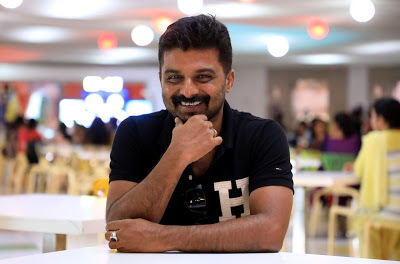
COLUMN: LOCATION DIARY
Actor Sudhi Koppa talks about his experiences in the films, ‘Aaadu’, ‘Sapthamashree Thaskaraha’, 'Anuraga Karikkin Vellam', ‘Manglish’ and ‘Paipin Chuvatile Pranayam’
Photo by Melton Antony
By Shevlin Sebastian
One day, actor Sudhi Koppa was told that a director was doing auditions at Ravipuram, Kochi. So he presented himself. But after performing a bit, the director Ajeesh Kumar (name changed) said that he did not suit the character. So Sudhi went away. Then a friend called and said that an audition was taking place in Thiruvananthapuram. “So I went there and discovered that it was Ajeesh,” says Sudhi. “He said, ‘I told you are not suitable.” Sudhi apologised and said that he did not know it was for the same film.
Then a few days later, another friend in Kochi called Sudhi and told him that a director was looking for new people. “I was informed at 8.30 p.m.,” says Sudhi. “By the time I reached the hotel, it was 9.30 p.m. Somebody asked me to wait. By the time I was allowed to go in, it was 10 p.m.”
But amazingly, it turned out to be Ajeesh again. He shouted at Sudhi and said, “What are you doing here?”
Sudhi replied, “Sir, I did not know it was for your film.”
Ajeesh looked at his associates and said, “This fellow comes everywhere. I told him no at Kochi, then he came to Thiruvananthapuram and now again he has come. Whenever I set up an audition he is there.”
Says a smiling Sudhi: “It was an embarrassing moment for me.”
Sudhi also felt embarrassed following the release of ‘Aaadu’ (2015) where he plays a character called Ganjavu Soman. “I stay in Palluruthy and wherever I went people would come up to me and whisper to me, “There is a shortage of ganja. Do you have some?”
Sudhi said, “No, I just acted as a peddler in the film.”
Sometimes, he would say, “No I don’t have. Do you have some?”
The men would reply, “Obviously, we don't have, that's why we asked you, Ganjavu Soman.”
Says Sudhi: “They were convinced I was a real-life peddler. It was hilarious.”
There were more fun moments on the sets of ‘Sapthamashree Thaskaraha’ (2014) where he plays a character who looks like a Bengali. At the location at Thrissur, Sudhi overheard a youth tell his friends, “These Bengalis have taken our jobs. Now they are taking our roles too.”
After the shot was over, Sudhi waved out to two friends of his. They looked at him puzzled. Nevertheless, they came up and then they realised it was Sudhi. “They looked completely shocked,” says Sudhi.
In 'Anuraga Karikkin Vellam' (2016), Sudhi played a character called Thangai. “The shooting took place near my home at Thoppumpady,” says Sudhi. “Most of the people know me.”
In the scene Sudhi is supposed to hit his wife Radhika (name changed). “As Thangai is hitting his wife, his mundu slips off,” says Sudhi. “I am supposed to carry on hitting my wife in my underwear.”
There were many takes. But Sudhi remained standing in his underwear only.
“My friends and neighbours came to have a chat,” he says. And Sudhi talked animatedly.
Finally, the film’s hero Biju Menon came up, and said, “The way you are talking it seems you are wearing a coat and trousers. But you are only wearing a underwear. Don't forget that.” Then Biju laughed.
Sudhi had a completely different experience on the sets of ‘Manglish’ (2014) at Kumbalangi.
“I had a scene opposite Mammooty,” says Sudhi. “But when I looked at him, I would remember his classic films like ‘Pazhassi Raja’ and 'Oru Vadakkan Veeragatha'.”
Sudhi’s specific job was to help Mammootty with the Kochi slang. “He knew it but I was there to help in case he needed some clarifications,” says Sudhi. When word went around that Sudhi was with Mammootty, his friends and relatives thronged the set.
At one point, Sudhi had stepped away. Suddenly, there was Mammooty’s voice on a megaphone saying, “Where is Sudhi Koppa? Koppa? Where are you? Come here.”
The people who knew Sudhi were stunned. “They realised that I was very close to Mammootty,” says Sudhi. “None of them knew that I was meeting the superstar for the first time. And when I came up to Mammootty Sir, he whispered something in my ears. Thanks to all this, I became a star with my neighbours and relatives.”
In ‘Paipin Chuvatile Pranayam’ (2017), Sudhi realised that acting can be physically very demanding. His character's name is Ayyappan. There is a scene where Ayyappan’s wife (played by Sruthy Jayan) is not well and he has to carry her for a distance of 50 metres to a boat on the river’s edge. “Shruthi weighs 55 kgs,” says Sudhi. “To lift her and carry her for a distance was not easy. And Shruthi kept twisting and turning to show her agony.”
Overall, Sudhi had to carry her 12 times, because of repeated takes. “In the end, I felt exhausted,” he says. “The next day my whole upper body was in pain and I could not move my arms at all.”
(The New Indian Express, Kochi, Thiruvananthapuram and Kozhikode)
Published on July 18, 2018 23:48
July 15, 2018
A One-Woman Army
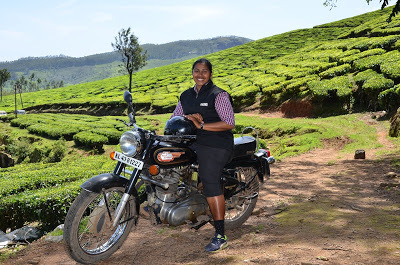
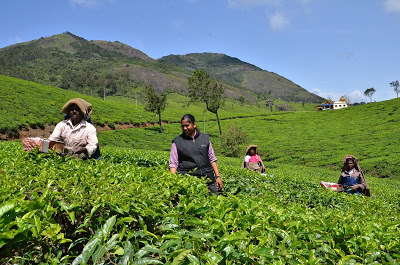
Ammu Joseph is the only woman currently who is working on the field in the tea plantation industry. She talks about her experiences at Devikulam, Munnar
By Shevlin Sebastian
It is a sunny morning in Devikulam, near Munnar. The sky is an azure blue. A steady breeze is blowing. In the distance, there are rolling hills. Ammu Joseph, 26, sets out on her Bullet Enfield. She is wearing a black jacket, half trousers and canvas shoes. Soon, she is riding through rough gravel up a steep road at the Lockhart Estate at Munnar belonging to the Harrisons Malayalam Limited company.
After a while, she stops at a place where a group of women workers are plucking tea leaves. Ammu asks, “Everything is fine?” Since there is a guest present, they nod politely.
What is unusual about Ammu is that she is the only woman currently who is working in the plantation industry in Kerala as an assistant manager. “I knew it would be a challenging job,” says Ammu. “It is a male-dominated area. I knew as a woman I would not get any special considerations. I would have to stay alone and travel on my own.”
But a year on, Ammu, who has a BSc (Forestry) degree from Kerala Agricultural University has adjusted to the work. Asked her job profile, Ammu says, “I am handling crop management, pest and disease management, harvesting and agricultural operations.”
However, her most important job is to deal with the labour force, the majority of whom are women. “There is a labour strength of 400 spread across two plantations,” says Ammu. “They stay in the labour colonies within the estates. Once a month there is a meeting and we thrash out the problems that they are facing, especially in the colonies.”
The women labourers are happy. “Ammu is a very understanding person,” says Mary, 58, a fifth-generation worker. “Because she is a woman she can understand us much better. Also, we are able to relax and have a heart-to-heart conversation with her.”
But it does not mean that Ammu is always soft. Once an elderly lady Radha complained to Ammu that her husband would drink a lot and physically harass her. “When I met him, I asked him what the problem was,” says Ammu. “He suddenly got scared when I confronted him. They are not used to women speaking with authority. Thereafter, he stopped disturbing Radha.”
Her reputation for being tough is spreading. A worker called Anjappar would also harass and shout at everybody. “But when people told him that they would inform me about his behaviour, he would go quiet,” says Ammu, with a smile.
It has been an eye-opening experience for Ammu, who grew up in Thrissur. “In the city, we are not bothered about the lives of other people,” she says. “But in the hills, everybody is closely linked to each other. They celebrate jointly. When a death takes place, everybody cries. They have lived and worked together for so many years. Hence, there is an intimacy.”
Since they work so closely with Nature, they have a deep respect for it. “Before they set out for work, they say a prayer to Nature,” says Ammu. “The people have a belief that they need Nature, today, tomorrow and the day after.”
They are also adept weather readers. “Just by observing the sky, the direction of the winds, the sunlight and the moon, they can predict the weather,” says Ammu. “They know when it will rain at least two days in advance. However, these are the skills of the senior generation. I don’t know whether their children will have the same aptitude.”
Asked whether, like the workers, she believes in Mother Nature, Ammu says, “There is some power in Nature. I don’t want to call it God. Earth has a power to look after us. If I am stuck somewhere in the night I always have a feeling that Mother Nature is looking after me. So, I have never felt scared. On the other hand, I feel a lot bolder these days.”
Incidentally, work on the estates starts at 8 a.m. and carries on till 11.45 a.m. when the leaves are weighed. There is a lunch break for one hour. Then they will resume work from 1 pm till 5 p.m. Apart from a basic pay, workers are given additional payment according to the kilos they collect. “On an average, each worker collects between 50 and 100 kgs every day,” says Ammu.
For Ammu, the work is physically taxing. In many areas, the Bullet cannot go through. So she has to walk a lot. “The toughest time is during the rainy season,” she says. “The whole day I am in the rain, wearing a raincoat. Even then it feels very cold. My shoes get wet. I also get wet sometimes. The rain is so strong. But when I stand with the workers, they feel energised and so do I.”
And her energy and boldness are being appreciated. “Ammu has made a difference,” says Jobsy Thomas, General Manager-Operations (High Range Group). “I feel that she communicates more transparently and openly than I, as a male, would be able to do so. At the same time, she has to get the work done. So it is a tough balancing act. But she has been doing quite well. Kudos to her.”
(The New Indian Express, Kochi, Thiruvananthapuram and Kozhikode)
Published on July 15, 2018 23:17
July 12, 2018
Rolling With The Ice


The Melto Creamery in Kochi provides roll ice-creams which are growing in popularity
Photos: Shafeeq M and his wife Zunairah; the different types of icecreams. Photo by A. Sanesh
By Shevlin Sebastian
At the Melto Creamery in the Kakkanad suburb of Kochi, a customer comes in and orders a Guava Chilli. Chef Zunairah Shafeeq immediately gets to work. She quickly cuts up two guavas into small pieces on an ice pan. Then she pours chilly powder on it. Zunairah takes up two triangular spatulas in two hands and keeps chopping on the guavas until they become tiny pieces. It sounds like a drummer banging at high speed. Then she pours high-fat milk over the mix. Using a flat knife, the mix is now spread out like a square paste by Zunairah on the pan.
“The pan has been imported from China,” says Shafeeq M, the husband of Zunairah and the owner of the outlet, along with his entrepreneur friend Shazil Hiqma. “The surface has a temperature of minus 35 degrees centigrade. The milk freezes immediately and becomes cream.”
Then once the paste solidifies, it is cut into three rectangles and made into rolls. These rolls are placed in a plastic cup and given to the customer along with a spoon. “This is called roll ice-cream,” says Shafeeq. “We are the first to make it in Kochi. Roll ice-cream is a street food in Bangkok. We got the idea when we saw videos of it on YouTube.”
The fruit ice creams, like Guava Chilli, are very popular with older customers, as the taste of the fruit is retained. “Also, they see it made right in front of their eyes,” says Shafeeq. “So, that makes it authentic.”
Some of the fruits that are used include the jackfruit, mango, strawberry, kiwi, banana, and the avocado.
There are also ice-creams that promote health benefits. One is the Matcha ice-cream. Matcha is a premium green tea powder imported from Japan. “It has been used in the traditional Japanese tea ceremony for hundreds of years,” says Shazil. “The Matcha has an excess of amino acids and a high level of antioxidants. It helps to boost the metabolism, lowers the cholesterol, and prevents a buildup of toxins.”
Adds Zunairah: “It is very bitter but when we add chocolate or fruit, it becomes tasty.”
But the premium item of the creamery is the gold-studded Thai ice-cream. “It is a regular roll ice-cream on which we paste a gold sheet,” says Shafeeq. “This has been imported from Dubai and is made of edible gold.” But the price is a cool Rs 1000. “The aim is to highlight the brand,” says Shafeeq.
While the elders loved the fruits, the youngsters go ga-ga over the chocolate items. These include ice-creams with the Nutella Hazelnut and Hershey's Macadamia Nuts. “These are our signature items,” says Zunairah. “It moves a lot. You can also have ice-creams with peanut butter.”
And the youth are happy. Says Soumya, a 24-year-old IT professional, “Melto is a slice of heaven in Kakkanad. Nope, I am not exaggerating. This place is awesome. Good bunch of people, nice ambience and awesome ice-cream!!”
Says another young woman Vinitha: “Melto has the most innovative ice-creams.”
What also helps are the generous amounts that can be had. Three rolls are equivalent to more than 300 grams of ice cream. “Because of this, we have a lot of repeat customers,” says Shazil. “In Kochi, people want quantity as well as quality.” Incidentally, the prices range from Rs 79 to Rs 350.
Asked the charm of ice-cream, Zunairah says, “It is always a reminder of our childhood days and the happy memories associated with eating it with our parents, sibling, and friends. So ice-creams will always remain popular.”
(Sunday Magazine, The New Indian Express, South India and Delhi)
Published on July 12, 2018 23:09
July 9, 2018
Converting Data Into Unique Sounds
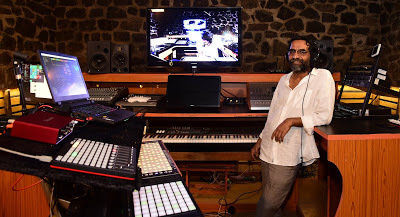
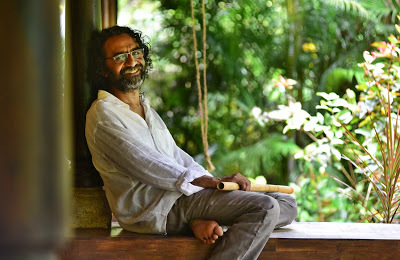
One of Kochi's leading digital musicians, Salim Nair is busy getting his first digital record ready
Photos by Albin Mathew
By Shevlin Sebastian
At his soundproof studio at Kochi, digital musician Salim Nair stands in front of his Linnstrument as well his Ableton Push2 midi controller. He is dressed casually in a white cotton shirt and grey trousers. The bespectacled musician then gently starts with a tap of one of the keys on the midi controller. The sound of a piano can be heard. This performance is seen live on Facebook.
And the name of the instrumental song is called 'When love rains'. Soon, he uses the sax, sitar and the flute. After a while, the sound becomes mesmerising; there is a rise and fall in the tone. Salim gets so involved in the playing that he keeps swaying from side to side. In his other songs, the instruments he uses include the sitar, sarangi, sarod, violin, santoor, saxophone, brass, and the keyboard. “I also use synthesized sounds,” he says. On YouTube and Facebook, he has put up over 60 song/videos.
“I call it a digital art music show,” says Salim. “[The late American writer] Susan Sontag has said art music requires the listener to put in a little bit of effort into listening. My songs have a slow and nuanced development. You can get bored. So my target audience is anybody who can appreciate music as more than just being a background sound.”
Now Salim is busy working on bringing out his first digital art album, 'Decohered', a collection of tone poems, a few of which are based loosely on the works of the late Urdu writer Faiz Ahmed Faiz.
Asked the charms of Faiz, Salim says, “His poems are very lyrical. It is very amenable to a song structure. I look for poems that can give me an emotional flow.”
A trained Carnatic musician since his childhood, Salim felt disappointed by the limitation of the traditional sound. “I used to play the flute and it is monophonic,” says Salim. “It cannot produce more than one sound.”
The other problem was the structure of Indian classical music. “Until 25 years ago, there were very specific caste-based restrictions about what you can sing and perform,” says Salim. “Most temple sanctums are closed to everybody except the Brahmins. The music was specifically created to support this hierarchical structure.”
That is the structure that Salim wants to break. “I am using Carnatic idioms and making my own rules,” he says. “Think of this: you spend 12 hours a day perfecting a song sung by composer Thyagaraja (1767-1847). What is the point of that? Express what you feel not what some singer felt 170 years ago.”
It was only when Salim, an electrical engineer by profession went to Philadephia, USA, in 1999 that he had a change of mind. While there, he realised that he could use the computer as a primary music instrument. “It has more capabilities than my single flute,” says Salim, who relocated to Kochi in 2014 and is working as a software programmer.
Asked the difference between digital and analog music, Salim says, “In analog music, we are physically using an instrument to create music. In digital, I am just changing data and this creates a different kind of sound. The production method is the biggest difference between analog and digital music.”
As to the charge that there is less soul in digital music, Salim says, “Is the violin natural? There is so much engineering that goes behind the making of a violin. On the other hand, digital music is more malleable. I am transferring what I am thinking directly. I don't have the constraints of a physical object.”
(Sunday Magazine, The New Indian Express, South Indian editions and Delhi)
Published on July 09, 2018 23:28
July 6, 2018
Memories Of A Family Helper
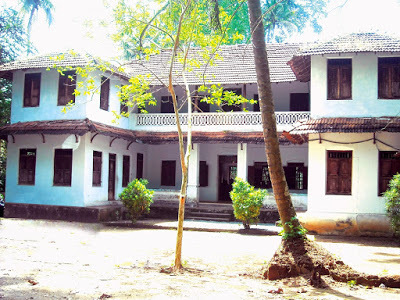
By Shevlin Sebastian
Photo: The ancestral house at Muvattupuzha
The other day my aunt sent a WhatsApp message in our family group: 'Pappi, who was with us at Muvattupuzha [Kerala] passed away. The funeral is at Neercode. Please pray for his soul'.
As soon as I read it, my mind immediately went to back my grandparents' house in Muvattupuzha. I would spend my summer vacations there with my mother and siblings from our home in Kolkata.
The back courtyard of their house was long and narrow. Across it, there were several trees, apart from a cattle shed, and a hen’s coop.
One day, when I was ten years old, while I was exploring the area, suddenly I saw a snake lying motionless on the ground. It was yellow in colour with black stripes going like a spiral all along its body. I looked at it stunned. Then I screamed and sprinted away to the kitchen where my grandmother was supervising the cooking and told her about it.
She immediately called the helper Pappi, a short man with thick biceps and shoulder muscles and possessing a vibrant energy. He strode out towards the courtyard, with a stick in his hand. But by this time the snake had moved away. After that, for days, I was afraid to go to the courtyard. My grandmother and Pappi laughed, but I did not want to take the risk.
This Pappi: I remember him taking me for a walk to a place in front of the town's bus terminus, where our family had some property. We had to climb steps, cut into the slope of a hill, reach a tin door, and go in. All around were trees and a large building in the distance.Pappi would use a shovel to clear wildly-growing grass, plants and bushes. As for me, all I did was to stand and stare and sometimes slip into a daydream.
My mother told me that when my grandfather was suffering from glaucoma, and could not see properly, Pappi would walk in front of him wearing a white shirt. My grandfather would aim his torch at Pappi's back and that would enable him to get his bearings when he was on his way to church.
The years went past. Then on July 22, 2001, my grandmother passed away. Pappi had come for the funeral. When I saw him, I was shocked. Pappi had become thin, frail and stooped. The contrast with his younger days was stunning. Somehow, even now, when I recall that image, I feel a stab of pain.
And then I realised that nobody can escape the circle of life: the blossoming of youth, a productive middle age, followed by a frail old age and, finally, death.Rest In Peace Pappi!
(Published as a middle in The New Indian Express, South Indian editions)
Published on July 06, 2018 01:02
July 4, 2018
Providing Colours To A Dark Cell
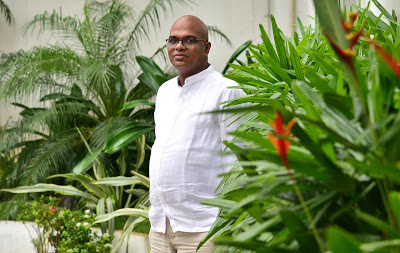
Murali Cheeroth, the noted Bangalore-based artist talks about his experiences of conducting an art camp in Tihar Jail in Delhi
Photo by Albin Mathew
By Shevlin Sebastian
In their New Delhi neighbourhood, the Naths and the Tiwaris were always arguing over one small matter or the other. One day, the son Rakesh Nath snapped. He went to the Tiwari house and using a piece of wire strangulated the elderly couple. Four relatives dropped in at different times. He strangulated all of them. The end result: Rakesh was caught and sentenced to life in prison. And he has been in Tihar Jail in New Delhi for the past fourteen years.
“He is a graduate,” says the Bangalore-based artist Murali Cheeroth, during a recent visit to Kochi. A group of six artists including Murali held an art camp at the jail recently for the prisoners; this was organised by the Central Lalitkala Akademi along with the Delhi Akademi.
“That was when I met Rakesh,” says Murali. “He told me that it was a moment's madness that made him commit the crime which destroyed his life.” Murali encouraged Rakesh to paint. He did so and Murali was impressed. “He is a realistic painter,” says Murali. “And he did some good work at the camp.”
Around 60 prisoners took part. “The aim was to change their criminal mentality and to enable them to develop an artistic sensibility,” says Murali.
And Murali discovered that many of them were talented. “I met a criminal Arjun Reddy from Andhra Pradesh,” says Murali. “From childhood, he was exposed to the sight of his father hitting his mother. In the end, the father killed the mother. Arjun was staying with his grandmother. She said something which angered him and he killed her in a fit of rage. That was how he was convicted.”
In the jail Arjun felt endlessly frustrated. “But taking part in the art classes has been a healing process for him,” says Murali. “He has gained an inner confidence.”In his abstract work, an acrylic on canvas, Arjun has drawn himself sitting in the middle of the canvas, with his body being pulled from all sides. “Arjun now feels that when he is released he will be able to contribute meaningfully to society,” says Murali.
Murali also urged the prisoners to develop their finer qualities. “One of them could write good Hindi,” says Murali. “So I told him to become a writer.”
As for the crimes they have committed Murali says that it consisted of murder, rape and cheating. “I met five prisoners who have been involved in rape cases,” says Murali. “But two of them told me they had been framed. One young man who belonged to a lower caste fell in love with a higher caste girl, so the girl's father, taking the police's help, framed a rape case against him and got him jailed.”
Another person who appears to have been framed is Suvojit Ghosh from Kolkata. One night, he talked to a prostitute at a street corner. The next day the lady was murdered. “On the CCTV, Suvojit's meeting with the woman was captured,” says Murali. “Soon, he was framed by the police.”
But Murali was impressed by Suvojit's artistic talent. “His theme is of gods and goddesses, in the Kalighat style,” says Murali. “Suvojit participated in an exhibition where 13 of his works were displayed.”
Another prisoner who Murali worked with was a convicted in the Nirbhaya rape/murder case, which rocked the nation a few years ago. “He told me that he has enormous regrets about what had happened,” says Murali.
Reluctant to wield the brush, Murali persuaded him that this was a way to get rid of his inner demons. “Soon, he started painting,” says Murali. “He did a work of a monkey jumping across a river, followed by a thousand monkeys. These monkeys are holding flags on which are written the numerous abuses which were hurled at the rape accused when he was convicted.”
The time spent at the jail was one of intense observation by Murali. And soon, he noticed that there was a caste system in the jail. “There were conflicts between different caste members,” says Murali. “The caste system is very strong in North India. In Kerala, everybody is getting educated. But in places like UP [Uttar Pradesh], they are not, and hence they are not aware of their rights as a citizen.”
As Murali interacted often with the prisoners, they also warmed towards him. “They were very friendly,” he says. “That was because I was giving them an experience which they don't usually get in jail. And I was also shaken to come across so many lives which have been destroyed thanks to a moment's madness.”
(Some names have been changed)
A Full-time Artist
Born in Thrissur, Murali Cheeroth did his Masters in Fine Arts from Kala Bhavan in Shantiniketan, West Bengal. He has been a full-time artist for the past 21 years. His works can be found in private collections in Japan, France, Canada, Thailand, Holland and India. He has been a two-time participant of the Sri Lankan Biennale. And has just completed an arts residency in Malaysia. Murali has taken part in numerous solo and group exhibitions. Murali has also taught at the College of Architecture, Ahmedabad and National Institute of Fashion Technology.
(Published in The New Indian Express, Kochi, Thiruvananthapuram and Kozhikode)
Published on July 04, 2018 00:04
July 1, 2018
The Culture Man
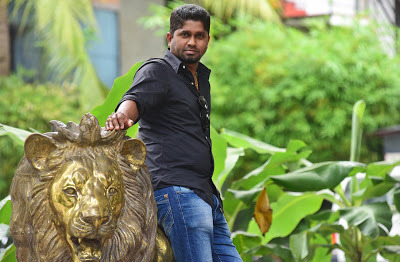
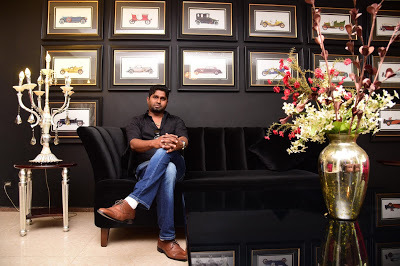
The Canada-based Ajeesh Rajendran is working hard to set up the Toronto International South Asian Film Awards even as he conducts cultural shows with Mollywood stars
Photos by Albin Mathew
By Shevlin Sebastian
On May 10, last year, the Toronto-based Ajeesh Rajendran was at the Niagara Falls, on the border between the USA and Canada. It was a cold and rainy day. He was waiting patiently for a Volvo bus which soon arrived from the USA. In it were Mollywood stars like Dileep, his wife Kavya Madhavan, Namitha Pramod, comic stars Ramesh Pisharady and Dharmajan Bolgatty, director Nadir Shah and the singer Rimi Tomy.
Ajeesh, who is the founder/CEO of the Toronto-based Blue Sapphire Entertainment Inc was organising a show with these stars. “It was my first time with them,” he says. “So I was feeling excited as well as apprehensive.”
But the apprehensions proved to be short-lived. “When they stepped out of the bus, they were all smiles and very friendly,” says Ajeesh.
Meanwhile, at the hotel where they were put up, Ajeesh asked the chef to prepare a big lunch, with many dishes. But he was taken aback when Kavya and Rimy made a suggestion. “Could you provide Kerala-style kanji (rice gruel), payar (beans) and chamandi (coconut chutney) said Kavya. “We have been on the road for a long time and are missing our home food.” Soon, all the other artists wanted the same thing.
Ajeesh complied quickly. Eventually, the 'Dileep Show 2017'at Toronto was a big hit. “In May, this year, [dancer and actor] Shobana gave a sold-out performance with the 'Trance' dance show,” says Ajeesh, while on a visit to Kochi. “I had brought her in 2015 also.” In 2016, Ajeesh held a successful show called 'To Laleetan by Sreekuttan'. Singer MG Sreekumar sang songs in which superstar Mohanlal had been featured in over three decades of acting.
Ajeesh, who is originally from Kollam, moved to Canada in December, 2012 when his wife gained a permanent residency permit. After doing small jobs here and there, he decided to embark as a show business entrepreneur. “I had acted in bit roles in Malayalam films for a long time, so it felt natural to gravitate to show business,” he says.
At this moment, Ajeesh is working hard to establish the Toronto International South Asian Film Awards (TISAFA). “It will be a celebration of South Asian talent,” he says. “All the Tamil and Malayalam films which were released between January 1 to December 31, 2017, have been eligible. Online voting was conducted from April 1 to May 15.”
Thereafter, a shortlist has been prepared, and a judging panel has just announced the winners in 24 categories like Best Film/Actor/Actress/Director/Screenplay/Cinematographer and so on. The award ceremony will take place in October.
The other day Ajeesh met actor/director Shoubin Shahir at a hotel in Kattapana (130 kms from Kochi) where the latter was shooting for the film 'Ambili'.
Ajeesh wanted to invite Shoubin to take part in TISAFA in October. Shoubin had won the Best Debut Director award for the film 'Parava'.
“Shoubin told me that this was the first time an organiser had personally invited him for an awards function,” says Ajeesh. “He told me he would come and support my new venture. I felt very happy when he said this.”
Meanwhile, when asked about his target audience, Ajeesh says there are 40,000 Malayali families in Toronto. “Most of them are in the IT industry,” he says. “Apart from that, there are nurses, physiotherapists and people working in day-care centres.”
Most of them are happy in their new country. “Once you get a taste of the comfortable life in Toronto, you end up staying there,” he says. “There is plenty of individual freedom, especially for women, and there is safety in public spaces, backed up by a strong law and order set-up. In Kerala, there are many laws but nobody is following them.”
However much they are disappointed with their home state, Malayalis are still homesick, especially the first generation. So, they like to watch Mollywood music and dance shows as well as films. “The people see the films only on the weekends, as they are very busy from Monday to Friday,” says Ajeesh.
Meanwhile, Ajeesh is in expansion mode. He has got a two-hour weekly slot in a leading TV channel where he showcases the news as well the social and cultural activities of the Malayali community. “I am enjoying every moment,” says Ajeesh. “I could never imagine my life would turn out this way.”
Published on July 01, 2018 23:04
June 26, 2018
Real Or Fake?
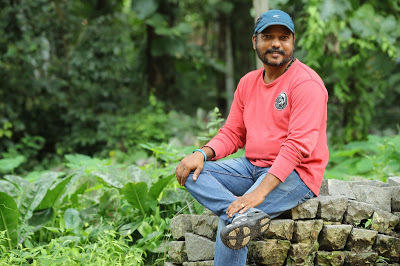
COLUMN: LOCATION DIARY
Art Director Joseph Nellickal talks about his experiences in the films, ‘Runway’, ‘Robin Hood’, ‘Anwar’, ‘Lion’ and ‘Naran’
By Shevlin Sebastian
In Joshiy's film, ‘Runway’ (2003), the hero Dileep smuggles spirits through the Walayar check-post. Since the crew did not get permission to shoot at the check-post, art director Joseph Nellickal replicated the original near the railway station at Kalamassery.
“We felt the space was similar to the area around Walayar and made the set,” he says.
But one day, when Joseph reached the set at 6 a.m., he noticed a lorry with a Tamil Nadu registration number which was parked there. “Suddenly, I saw the driver give a slap to the helper,” says Joseph. “So, I enquired about what had happened.”
The driver said that he had crossed the Walayar check post by 3 a.m. Thereafter, he told the helper to drive the vehicle while he had a nap. But when the driver woke up, he saw that they were still at the check-post. So he thought that his assistant had gone around in circles and returned to the check-post. That was why he was slapping the driver.
“So I told the driver that this was a film set,” says Joseph. “He just could not believe it. He went around and inspected everything and noticed that there were some sacks in the area where the office was supposed to be. That was when he finally became convinced. This was a case of where the set was so realistic that people could not distinguish the real from the fake.”
Something similar happened in the film, ‘Robin Hood’ (2009). There was a scene in which Prithviraj had to enter an ATM and draw some money. “In those times, the ATMs had not become popular,” says Joseph. “So I made one.”
However, as they were busy setting up the set, unknown to them, a well-to-do man entered the booth. “He thought it was an actual ATM and put his card inside the holder,” says Joseph “But it got stuck.”
So, firstly the man had to be told that it was a fake ATM counter. Secondly, the entire structure had to be dismantled so that the card could be returned to the man and the recorder could be fixed again. “The shoot was delayed by several hours before we could get the ATM ready again,” says Joseph.
There was a crisis of a different kind on the sets of the film ‘Anwar’ (2010). The location was at the Cochin University of Science and Technology (CUSAT). A set was built in front of the main university building. Prithviraj entered a corridor, placed a bomb and left. “This was a powder bomb and not one that caused a fire,” says Joseph. “Just behind the set, there was a window of the main building. But under the impact of the blast, the window burst open. All the powder entered the room.”
It was valuation room where all the answer sheets were kept. The tables were covered with black powder, including the computers and the answer sheets. The Registrar came running. When he saw the scene, he began perspiring. “He felt that he would lose his job,” says Joseph. “I assured him that we would clean the entire room.”
Joseph’s team which consisted of ten people along with a couple of CUSAT employees cleaned every paper, computer and table. The shattered glass was replaced. “We worked through the night and finished by 6 a.m.,” says Joseph. “We had to ensure that nobody came to know about it, otherwise, it would have become a major issue.”
During the shoot of the film, ‘Lion’ (2006), an issue of a different kind cropped up. In the storyline, there was a shootout between some policemen and goondas on the Venduruthy Bridge at Kochi. A couple of policemen shot at the miscreants. Two of them were supposed to fall from the bridge into the water. “We made dummy figures, with them wearing shirts and mundus,” says Joseph. “They were thrown from the bridge and floated away.”
However, on the same day, at 2 p.m., a man jumped from the Kumbalam bridge and drowned. The police could not locate the dead body. “Suddenly somebody noticed one of the film's dead bodies floating past,” says Joseph. “So they informed the police. They got some divers to bring the body to the shore. The parents were called to identify their son. But when the body was inspected, it was realised that it was a fake, leading to much embarrassment for the police.”
Joseph came to know about this when an item appeared in the next day's newspaper: 'Fake body proves to be a problem for the police'.
Then in ‘Naran’ (2005), it was the case of a fake tree made of fibre. It was being transported from Hogenakkal, Karnataka, where one schedule was over, to Thiruvananthapuram.
At the Tamil Nadu-Kerala border, the lorry was allowed to go through since it belonged to a film crew. But as the vehicle went past, inspectors saw a tree sticking out from the back. So they gave chase.
“The driver was abused and asked to get down,” says Joseph. “The Forest Department officers said that he was smuggling wood into the state. But the driver stated that this was not an actual tree. They did not believe it. Then an officer climbed into the truck and it was only when he knocked on the tree that he realised it was not made of wood, but fibre. So they were allowed to leave."
Not surprisingly, the driver smiled silently at his helper.
(The New Indian Express, Kochi, Thiruvananthapuram and Kozhikode)
Published on June 26, 2018 23:05
June 22, 2018
Fruits, Fruits And More Fruits
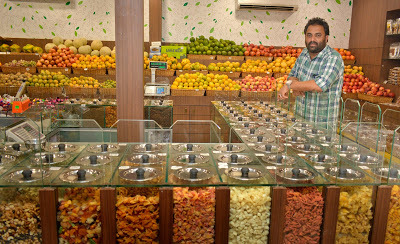
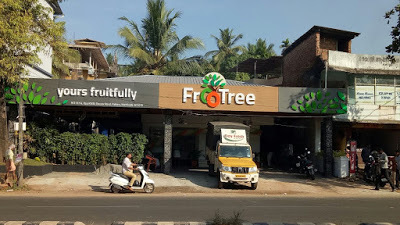
Entrepreneur KP Musthafa talks about the benefits of imported fruits
Photos: K. Musthafa by Manu R Maveli; the new store
By Shevlin Sebastian
One morning KP Musthafa was standing outside his newly-opened store 'Frootree' in Kozhikode having a chat with his friend. Suddenly a middle-aged woman came up and stood near the entrance for a few moments. She was hesitating to enter.
Finally, Musthafa said, “Madam, is there any problem?”
The woman said, “I was wondering whether the fruits are okay, and don't have pesticides.”
Musthafa said, “Madam, all these fruits have been imported, after stringent checking. There is nothing to worry.”
The woman smiled as a few tears rolled down her face.
As Musthafa looked shocked, the woman said, “My son is in Stage 4 cancer. I wanted to buy some good fruits for him.” Musthafa nodded and held her hands.
Yes, indeed, Musthafa's shop deals in imported fruits only. He gives a break-up: green leaves are from Holland; passion fruit from Thailand; lemons and oranges from Spain; plums and avocados from New Zealand. “We buy a lot of fennels, baby marrow, baby carrot and asparagus from South Africa,” says Musthafa. “The grapes are from the USA, while mushrooms are from Holland.”
As for the most popular fruits, he says it is oranges and apples. But there are accusations that some apples, especially with the brand name of Washington have been waxed so that it can shine and last longer. “This waxing is safe,” says Musthafa. “The produce goes through stringent tests in the USA before it is allowed to be exported.”
Asked why imported fruits are so costly, Musthafa says, “Sometimes, there is 100 per cent duty. For apples, it is 50 per cent. Hence, the retail price of a Washington apple starts at Rs 200 per kilo and goes up to Rs 250.”
The most expensive are raspberries, cranberries and strawberries. Sometimes, these are being sold at Rs 2000 per kg and are imported from Mexico, Morocco, and the USA.
But importing to Kozhikode has not been an easy affair. Last year Musthafa imported dates from Saudi Arabia. It remained in the Kozhikode airport for 18 days because of various Customs and other difficulties. Overall. Rs 2.5 lakh was the extra expense for the entrepreneur. This included Rs 1.3 lakh for the refrigerated storage fees, while Rs 38,000 was the test charges to find out whether the product is good. Then there was customs duty and other charges.
So Musthafa has stopped importing into Kerala. Instead, he imports to Bangalore or Hyderabad and brings it by road to Kozhikode. “But if the material is from Mumbai I can bring it by domestic flight and there is no problem because it has gone through one checking,” he says. “But the expenses go up.”
As for his customers, most belong to the upper middle classes and are thus able to afford the steep prices. Plus, there is the charm of fruits. “I have yet to meet a person who sees a fruit and does not have the desire to eat it,” says Musthafa. “They are buying for their children and for them also. In every fruit or leaf, there are health benefits.”
Take the basil leaf. “This is good for cough, throat and chest congestion,” says Musthafa. “The leaves can be made into a gravy. You can also eat it directly. Also, many cardiologists recommend cranberries as it is good for the blood.”
But for Musthafa personally, what he likes the most is the juice of wheatgrass. “It has a lot of protein,” he says. “And it helps reduce sugar. There are wheatgrass tablets in the US. It is that good.”
Meanwhile, Musthafa is working hard to set up numerous ‘Frootree’ filling stations. These will be set up at various places on the National Highway.
“When you are travelling on the highway you don't need to get down,” says Musthafa. “You drive to the filling station and buy juice, snacks, tea, sandwiches or burgers. It is like going to a petrol station. Buy the food and carry on in your journey.”
Soon, there will be an app which can be downloaded. “Say, you are travelling from Ernakulam to Kozhikode, you can identify an outlet, place the order from the menu in advance, and come at the right time and collect it,” says Musthafa. “There is no time-wasting. These will be one every 50 kms. It will start soon.”
(The New Indian Express, Kochi, Thiruvananthapuram and Kozhikode)
Published on June 22, 2018 23:04
June 20, 2018
COLUMN: LOCATION DIARYScriptwriter Sethu talks about his ...
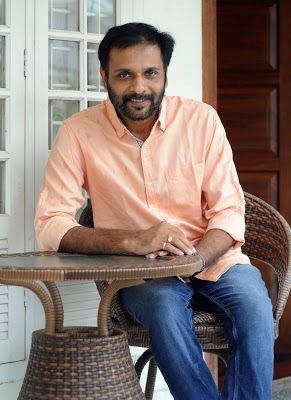
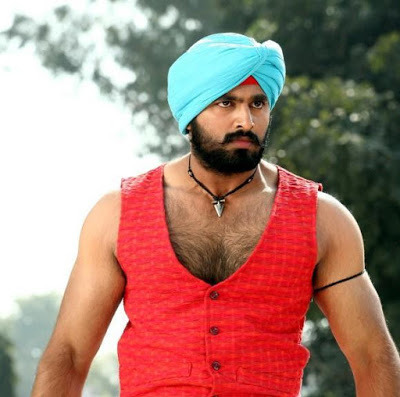
COLUMN: LOCATION DIARY
Scriptwriter Sethu talks about his experiences on the sets of 'Mallu Singh', 'Salaam Kashmier' and his upcoming maiden directorial venture, 'Oru Kuttanadan Blog'
Photos: Scriptwriter Sethu by A Sanesh; Unni Mukundan in 'Mallu Singh'
By Shevlin Sebastian
During the shoot of 'Mallu Singh' (2012), scriptwriter Sethu noticed a beautiful Punjabi girl always standing on the sets and staring at Unni Mukundan, who plays a turbaned Punjabi in the film. Soon the parents arrived on the set. Then they befriended Unni. After a while, they began to bring breakfast and lunch for Unni. He was invited to their home.
“Because he grew up in Gujarat, Unni speaks good Hindi,” says Sethu. “So he was able to have good conversations with them.”
Finally, one day, the girl's parents proposed marriage to Unni for their daughter. “Their daughter had been smitten with Unni from the first day she saw him,” says Sethu. “The parents also felt that Unni would be a perfect son-in-law.”
It was then that Unni took off his red turban, and said that he is a Malayali. “The family took their disappointment in a sporting spirit,” says Sethu.
The Punjabis are a sporting lot. One day, art director Joseph Nellickal wanted to convert an ordinary area into 'Mallu street', where only Malayalis stayed. “Initially, we thought we would do it in Film City, Hyderabad since we needed a school and several shops,” says Sethu.But while they were wandering about in Punjab looking for locations they went to a village called Nabha where Joseph saw an arch on a street. “We did not know for what it was made,” says Sethu. “Behind it, there was a large cowshed and a few shops.”
Joseph suggested that on the arch a board called 'Mallu Street' could be put up. “And then we could put Malayalam and Hindi signboards on all the shops,” says Sethu. “When we asked the local people, they agreed.”
The shoot on the street lasted for 22 days. But what was amazing for Sethu was when the producer of the film, Mahaa Subair told him recently that the area is still called Mallu Street.
“The board on the arch has still not been removed,” says Sethu. “They have retained all the signboards on the shops. And in Nabha Mallu Street is a permanent part of the locals' vocabulary. This was very exciting to know.”
Apart from exciting moments, Sethu has experienced tense situations. During the shoot of 'Salaam Kashmier' (2014), one morning, director Joshiy and the crew were having breakfast in the Valley. “Suddenly, several Army jeeps arrived,” says Sethu. “Many soldiers jumped out. They were pointing their AK47 guns at the huts lining the slopes of the hills.”
An officer said that there was a threat. “He said that this was one of the most dangerous spots,” says Sethu. “Just eight hours earlier, there had been an encounter between two terrorists and the security forces. So, they had come to rescue us. We took our food and ran to the vehicles. I have enormous respect for the Army. They are very vigilant in Kashmir.”
So vigilant that they tested Joshiy's patience once. One day after the shoot was over the crew went to stay at various Army camps. The time was 7 p.m. As for Joshiy he was staying at a very high-security camp. But after two hours, there was a call from Joshiy to the producer Mahaa Subair. In an angry voice, Joshiy said, “I can't wait for dogs.”
Subair was puzzled and so were the crew. “Then we thought that maybe Joshiy Sir did not get dinner,” says Sethu. “So Subair checked with the canteen and they said they had supplied the food at 7 p.m.”
Later, the crew came to know what happened. When Joshiy arrived at the gate of his camp, a sniffer dog had to inspect him before he could enter. “No one, no matter how senior, was allowed inside before being sniffed,” says Sethu. “But the dog was asleep. So Joshiy had to wait for two hours outside. The Army staff did not want to awaken the dog suddenly because the animal would not do the job properly. So they waited for the dog to come awake. In the end, Joshiy lost his cool.”
There was a need to stay cool in Sethu's upcoming maiden directorial venture, 'Oru Kuttanadan Blog'. In one scene Mammooty travels on a Bullet on a road between paddy fields. Behind him were three bikes with actors Gregory, Shahin Siddique, Vivek Gopan and Nandan Unni on them. “It was a long shot,” says Sethu. As they were riding, suddenly Shahin lost his balance and the bike skidded and fell to one side. “Gregory's leg was twisted to one side,” says Sethu. “Shahin had bruises on his arms.”
So, Gregory and Shahin were rushed to the hospital. And Sethu was thinking that he would lose a day of shooting. That was when Mammootty called him and said, “The show has to go on, no matter what happens. The only way you can do that is to change the script.”
Sethu nodded and immediately sat down to work. Within an hour, he rewrote the scene in such a way that there was only one bike behind Mammooty. “Thanks to Mammooty Sir's calmness and vast experience, we saved the day's shooting and was able to move forward,” says Sethu.
(The New Indian Express, Kochi, Kozhikode and Thioruvananthapuram)
Published on June 20, 2018 00:38



